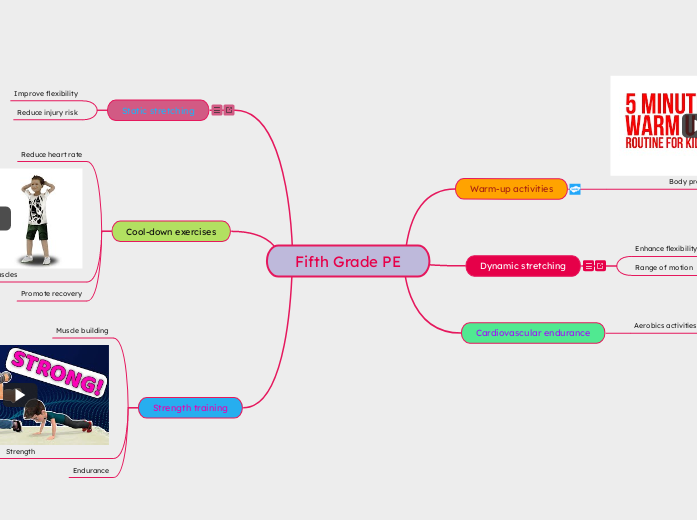a Sinesipho Magxunyana 1 éve
139
Fifth Grade PE

a Sinesipho Magxunyana 1 éve
139

Még több ilyen
Static stretching is a common type of stretching used in a PE class. It involves holding a stretch for a specific period, usually around 10-30 seconds. Static stretching is beneficial for increasing flexibility, improving range of motion, and reducing muscle soreness. It can also help to improve posture and relieve tension in the muscles. Examples of static stretching include hamstring stretches, quad stretches, and calf stretches.
https://static.wixstatic.com/media/65fa05_3f3030816b42434c96589ab3ab3c4cf5~mv2.jpg/v1/fill/w_390,h_336,al_c,q_80,usm_0.66_1.00_0.01,enc_auto/65fa05_3f3030816b42434c96589ab3ab3c4cf5~mv2.jpg
Cardiovascular endurance (sometimes referred to as cardiorespiratory endurance) is the ability of your heart and lungs to work together to supply oxygen during a sustained period of exercise. It is a measure of how efficiently your body uses oxygen during strenuous physical activity. Sometimes referred to as aerobic or cardio fitness, this type of activity is characterized by moderate-to-high intensity physical activity over an extended period of time. Some examples of cardio fitness activities include running, jogging, swimming, cycling, dancing, and brisk walking. Engaging in these types of movements is a fantastic way to boost one's heart rate, promote blood flow, and improve cardiovascular endurance. Sustained cardio movement over a period of time can also help promote better breathing, decrease the chance of heart disease. and improve mental wellbeing.
https://static.wixstatic.com/media/65fa05_63f7e2912ae5408ab787d0cb8215bf2e~mv2.jpg/v1/fill/w_740,h_388,al_c,q_80,usm_0.66_1.00_0.01,enc_auto/65fa05_63f7e2912ae5408ab787d0cb8215bf2e~mv2.jpg
Physical education is a vital part of a child's education, and it is essential to ensure that students develop healthy habits and skills at a young age. One crucial aspect of physical education that is often overlooked is Dynamic stretching.
Dynamic stretching involves making active movements that stretch the muscles to their full range of motion. These exercises often simulate functional movements and help prime the body for more intense training. Dynamic stretching involves movement and is typically used as a warm-up before a physical activity. It helps to increase body temperature, blood flow, and muscle activation. Dynamic stretching is beneficial for improving flexibility, range of motion, and coordination. Examples of dynamic stretching include leg swings, arm circles, and walking lunges.
https://static.wixstatic.com/media/65fa05_998bf51597f040f9ba43dff27c738cc2~mv2.jpg/v1/fill/w_388,h_388,al_c,q_80,usm_0.66_1.00_0.01,enc_auto/65fa05_998bf51597f040f9ba43dff27c738cc2~mv2.jpg